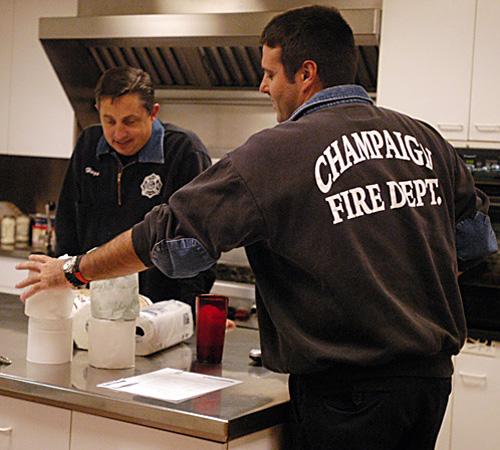Law will secure pensions for disabled firefighters

Firefighter Barry Miller, 33, of Champaign, right, speaks with another firefighter Curtis Hays, 41, also a Champaign resident, in the kitchen of the Champaign Fire Department on Thursday. Erica Magda
Oct 26, 2007
Last updated on May 12, 2016 at 05:52 p.m.
A bill that will help disabled Illinois firefighters secure their pensions was signed into law on Oct. 17.
The new law guarantees that firefighters who apply for disability pensions will not be discriminated against should their application be rejected. It also states that three physician opinions necessary for the request need not agree as to the existence or extent of a disability.
Terry Cox, the executive director of the Illinois Firefighters, said that the problem of denied disability pensions is a recent phenomenon.
“We did not have that big of a problem until the cost of insurance started skyrocketing,” he said.
Get The Daily Illini in your inbox!
State Sen. Mike Frerichs, D-Gifford, who is also a volunteer firefighter, said that through conversation with some firefighters in Springfield, he discovered that cities have found loopholes to avoid paying out disability pensions.
“If you had an unscrupulous city manager and a somewhat pliant doctor … you could have disabled firefighters not receiving the pensions,” Frerichs said.
Firefighters pay money out of their paychecks into independent pension funds, which often consist of former members of the city’s fire department. But this is not enough money to cover the pensions, so cities have to pay the difference between the total cost of the pension and the amount in the autonomous fund.
Opponents of the law, like Gov. Rod Blagojevich who vetoed the bill, worry it is going to cost the cities too much money.
In his veto message, the governor wrote that he would have approved the bill if the portion concerning the three concurring physician opinions would be removed. But a three-fifths majority in both the House and Senate overrode the veto a few weeks later.
Because the majority of firefighters in Illinois are volunteers, many firefighters injured on the job would never even be dealing with the pension board, said Rantoul Fire Chief Ken Waters.
Instead, he said, “they would get a workman’s (compensation) claim. On ours, they’re paid equivalent to what their normal full-time job pays.”
Some members of downstate firefighter pension funds said that they had very few problems working with the cities to dole out pension money and also noted that there simply were not that many injuries in the first place.
In Urbana, Fire Chief Michael Dilley said that the department has not had any problems. Dilley said that he cannot remember anyone being denied a pension in his 24-year career as a full-time firefighter in Urbana.
“In terms of what we have here downstate, I can say that the cities have done a really good job,” Dilley said.
Tad Beddow, president of the Danville Fire Fighter Pension Fund and also a firefighter, said his department has never had a problem.
Danville, which Beddow conceded is “not as rich as Champaign,” has an aging population of firefighters and nearly as many current firefighters as pensioned ones.
“We’re doing fine paying out,” he said.
Although it may not be the most common problem, Cox said, it can still be very difficult for a firefighter denied his pension to re-enter the department.
An injured firefighter may still find himself unable to front the legal fees associated with fighting to reenter the force after a denied pension, even though Frerichs’ legislation guarantees that the plaintiff will be reimbursed.
The legislation also guarantees that a firefighter whose pension has been denied is guaranteed a spot back on the force at the same rank and pay.
“A few firefighters slipped through the cracks,” Frerichs said. “We’d like to make sure that doesn’t happen again.”





